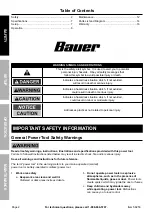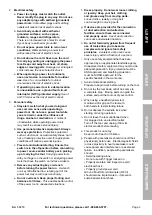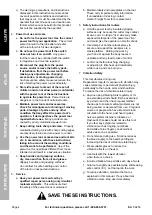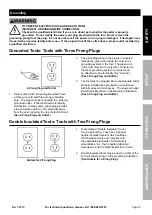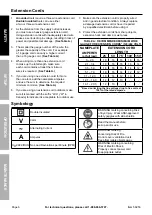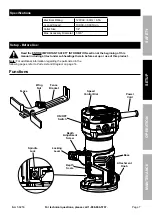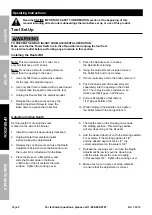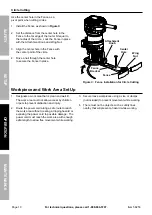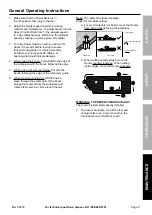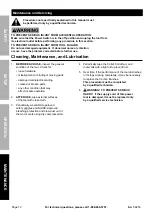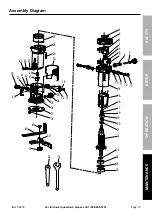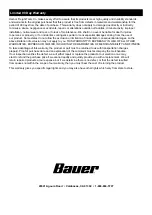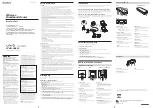
Page 4
For technical questions, please call 1-888-866-5797.
Item 58253
SA
FE
TY
OP
ERA
TI
O
N
MAINT
ENANC
E
SE
TUP
q. The warnings, precautions, and instructions
discussed in this instruction manual cannot
cover all possible conditions and situations
that may occur. It must be understood by the
operator that common sense and caution are
factors which cannot be built into this product,
but must be supplied by the operator.
4.
Power tool use and care
a.
Do not force the power tool. Use the correct
power tool for your application.
The correct
power tool will do the job better and safer
at the rate for which it was designed.
b.
Do not use the power tool if the switch
does not turn it on and off.
Any power
tool that cannot be controlled with the switch
is dangerous and must be repaired.
c.
Disconnect the plug from the power
source and/or remove the battery pack,
if detachable, from the power tool before
making any adjustments, changing
accessories, or storing power tools.
Such preventive safety measures reduce the
risk of starting the power tool accidentally.
d.
Store idle power tools out of the reach of
children and do not allow persons unfamiliar
with the power tool or these instructions
to operate the power tool.
Power tools are
dangerous in the hands of untrained users.
e.
Maintain power tools and accessories.
Check for misalignment or binding of moving
parts, breakage of parts and any other
condition that may affect the power tool’s
operation. If damaged, have the power tool
repaired before use.
Many accidents are
caused by poorly maintained power tools.
f.
Keep cutting tools sharp and clean.
Properly
maintained cutting tools with sharp cutting edges
are less likely to bind and are easier to control.
g.
Use the power tool, accessories and tool bits
etc. in accordance with these instructions,
taking into account the working conditions
and the work to be performed.
Use of the
power tool for operations different from those
intended could result in a hazardous situation.
h.
Keep handles and grasping surfaces
dry, clean and free from oil and grease.
Slippery handles and grasping surfaces
do not allow for safe handling and control
of the tool in unexpected situations.
5.
Service
a.
Have your power tool serviced by a
qualified repair person using only identical
replacement parts.
This will ensure that
the safety of the power tool is maintained.
b. Maintain labels and nameplates on the tool.
These carry important safety information.
If unreadable or missing, contact
Harbor Freight Tools for a replacement.
6.
Safety instructions for routers
a. Hold the power tool by insulated gripping
surfaces only, because the cutter may contact
its own cord. Cutting a “live” wire may make
exposed metal parts of the power tool “live”
and could give the operator an electric shock.
b. Use clamps or another practical way to
secure and support the workpiece to a
stable platform. Holding the work by
your hand or against the body leaves it
unstable and may lead to loss of control.
c. Let bit cool before touching, changing
or adjusting it. Bits heat up dramatically
while in use, and can burn you.
7.
Vibration Safety
This tool vibrates during use.
Repeated or long-term exposure to vibration may
cause temporary or permanent physical injury,
particularly to the hands, arms and shoulders.
To reduce the risk of vibration-related injury:
a. Anyone using vibrating tools regularly or for
an extended period should first be examined
by a doctor and then have regular medical
check-ups to ensure medical problems are not
being caused or worsened from use. Pregnant
women or people who have impaired blood
circulation to the hand, past hand injuries,
nervous system disorders, diabetes, or
Raynaud’s Disease should not use this tool.
If you feel any symptoms related to
vibration (such as tingling, numbness,
and white or blue fingers), seek medical
advice as soon as possible.
b. Do not smoke during use. Nicotine reduces
the blood supply to the hands and fingers,
increasing the risk of vibration-related injury.
c. Wear suitable gloves to reduce the
vibration effects on the user.
d. Use tools with the lowest vibration
when there is a choice.
e. Include vibration-free periods each day of work.
f. Grip tool as lightly as possible (while still keeping
safe control of it). Let the tool do the work.
g. To reduce vibration, maintain the tool as
explained in this manual. If any abnormal
vibration occurs, stop use immediately.
SAVE THESE INSTRUCTIONS.


